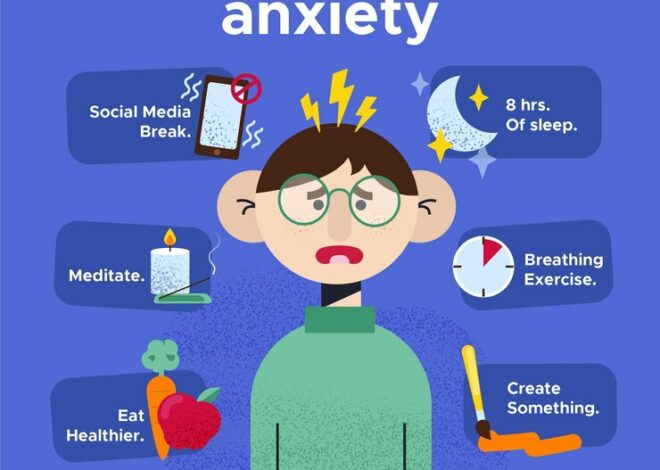Anxiety: Types, Causes, Symptoms & Treatments

Anxiety is a prevalent mental health condition that affects millions of people worldwide. It can manifest in various forms, each with its own set of symptoms and triggers. Understanding the different types of anxiety, their potential causes, identifying symptoms, and exploring available treatments is crucial for managing this condition effectively.
Types of Anxiety Disorders:
- Generalized Anxiety Disorder (GAD): is marked by excessive worry about various life aspects like work, relationships, and health.
- Panic Disorder: entails sudden, intense panic attacks with physical symptoms like chest pain and dizziness, often without apparent triggers, causing a sense of impending doom or loss of control.
- Phobias: Phobias are irrational and intense fears of specific objects, situations, or activities. Common phobias include fear of heights (acrophobia), spiders (arachnophobia), and social situations (social phobia). Consequently, phobias can significantly interfere with daily functioning and may lead to avoidance behaviors.
- Obsessive-Compulsive Disorder (OCD): Intrusive and repetitive thoughts (obsessions) and compulsive behaviors or rituals performed to alleviate anxiety (compulsions) characterize OCD.
- Post-Traumatic Stress Disorder (PTSD): PTSD can develop following exposure to a traumatic event, such as combat, natural disasters, or physical assault. Additionally, symptoms may include flashbacks, nightmares, hypervigilance, and avoidance of triggers associated with the traumatic experience. So, PTSD can significantly impair daily functioning and quality of life.
Causes of Anxiety:
The exact cause of this disorders is complex and multifactorial, involving a combination of genetic, biological, environmental, and psychological factors. Potential causes and risk factors may include:
- Genetics: Predisposition to developing similar conditions may occur in individuals with a family history of anxiety disorders.
- Brain Chemistry: Imbalances in neurotransmitters, such as serotonin and dopamine, can contribute to the development of anxiety disorders.
- Environmental Stressors: Traumatic events, chronic stress, and adverse childhood experiences can increase the risk of developing anxiety disorders.
- Personality Traits: An increased susceptibility to anxiety disorders may be associated with certain personality traits, such as perfectionism, neuroticism, and low self-esteem.
Symptoms of Anxiety:
Symptoms can vary widely depending on the specific type of disorder and individual characteristics. Common symptoms may include:
- Excessive worry or apprehension
- Feelings of restlessness or irritability
- Difficulty concentrating or focusing
- Muscle tension or trembling
- Fatigue or sleep disturbances
- Rapid heartbeat or shortness of breath
- Panic attacks (sudden onset of intense fear or discomfort)
Treatment Options:
Effective treatment for this disorders often involves a combination of medication, psychotherapy, and lifestyle modifications. Treatment approaches may include:
- Medication: Antidepressants, anti-anxiety medications, and beta-blockers may be prescribed to alleviate symptoms of anxiety disorders.
- Psychotherapy: Cognitive-behavioral therapy (CBT), exposure therapy, and mindfulness-based therapies can help individuals identify and challenge irrational thoughts and behaviors associated with anxiety.
- Lifestyle Changes: Stress management techniques, regular exercise, adequate sleep, and healthy dietary habits can help reduce symptoms and improve overall well-being.
- Support Groups: Joining support groups or seeking support from friends, family, or mental health professionals can provide valuable emotional support and coping strategies.
In conclusion, this disorders are complex and debilitating conditions that can significantly impact daily functioning and quality of life. however, with proper diagnosis and treatment, individuals with anxiety disorders can learn to manage their symptoms effectively and lead fulfilling lives. Seeking support from mental health professionals, engaging in therapy, and adopting healthy coping strategies are essential steps toward recovery and well-being.

